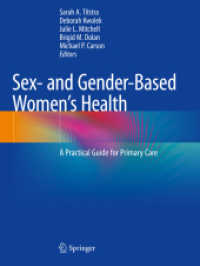基本説明
Explores fully the extent and significance of Boas's roots in the German intellectual tradition and late nineteenth-century German anthropology.
Full Description
Franz Boas, the major founding figure of anthropology as a discipline in America, came to the United States from Germany in 1886. This volume in the acclaimed History of Anthropology series is the first to explore fully the extent and significance of Boas' roots in the German intellectual tradition and late-19th century German anthropology. Boas' own early essay ""The Study of Geography"", reprinted in this volume, suggests his profound debt to the Herderian tradition of ""Volksgeist"" and ""Nationalcharakter"" - an intellectual lineage Matti Bunzl traces from Wilhelm and Alexander von Humboldt through Ritter, Ratzel, Waitz and Bastian to Boas. Benoit Massin painstakingly reconstructs another powerful influence on Boas, that of Rudolf Virchow, the leading physical anthropologist in Germany in the days before the discipline took its extreme racialist turn in that country. Drawing on letters from Boas' adolescence and early manhood, Julia Liss shows how the intellectual and cultural forces that formed his mature anthropological viewpoint figured clearly in his own ""Bildung"". Shifting the focus from Germany to the United States, essays by Ira Jacknis, Judith Berman and Thomas Buckley treat certain problematic aspects of the ""Volksgeist"" tradition, viewed as an attempt to constitute for each Native American group a permanent archive of cultural material free of contamination by European categories. Suzanne Marchand's essay on the political implications of German Near Eastern archaeology provides a distant counterpoint to the colonial situation of Boasian ethnography in America. Recovering the important but little understood Germanic influences on Boasian ethnography, this volume offers a new perspective on the historical development of American anthropology.
-

- 電子書籍
- パンダのパ リハビリ病院エクササイズ
-

- 電子書籍
- P女子寮のネコである 7






